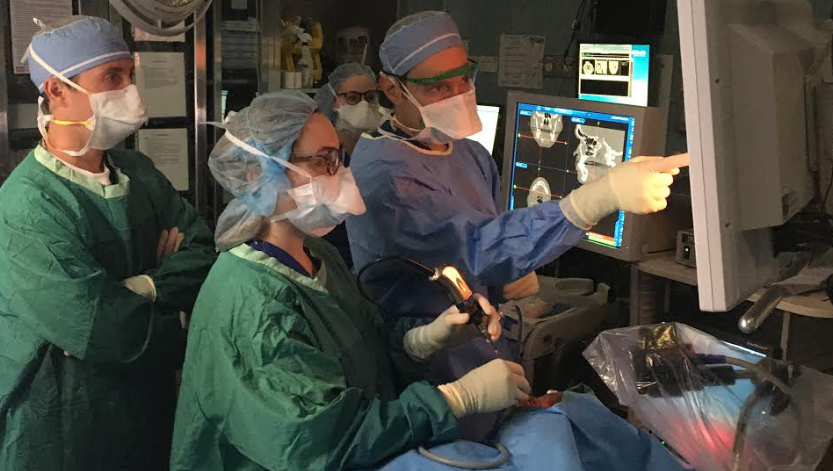How to Choose an ENT Over a General Practitioner for Recurring Issues
Exploring the Field of Otolaryngology: What to Expect When You Get In Touch With an ENT
Otolaryngology, frequently described as ENT, incorporates the diagnosis and therapy of ear, nose, and throat conditions. For those experiencing relevant problems, consulting an ENT professional can supply quality and relief. Recognizing what to expect throughout such assessments is crucial for efficient communication and care. This review will detail essential facets of the ENT experience, consisting of usual reasons for sees and the processes associated with diagnosis and therapy.

Understanding Otolaryngology: A Review
Otolaryngology, usually described as ENT (Nose, ear, and throat) medicine, is a customized branch of medication that concentrates on the medical diagnosis and treatment of problems influencing these important areas of the body. This area incorporates a wide array of conditions, consisting of those pertaining to hearing, balance, respiratory system feature, and speech. Otolaryngologists are educated to manage both clinical and medical therapies, utilizing innovative methods and innovations. Their knowledge expands beyond traditional disorders, resolving concerns such as allergic reactions, sinus infections, and hearing loss. Additionally, they play a vital duty in the monitoring of head and neck cancers cells, giving detailed care tailored to individual patient needs. In general, otolaryngology stays essential for preserving health and wellness and top quality of life in affected people.
Usual Factors to See an ENT Specialist
Numerous individuals seek the competence of an ENT specialist for a variety of factors, mirroring the varied nature of conditions that influence the throat, nose, and ear. Typical issues include persistent sinus problems, which typically causes consistent nasal blockage and face pain. Allergic reactions and their connected signs and symptoms, such as sneezing and itching, likewise motivate sees to these experts (Sinus). Hearing loss, whether gradual or sudden, is an additional substantial reason for assessment. Additionally, individuals may look for evaluation for throat disorders, including relentless hoarseness or ingesting problems. Rest apnea, defined by cut off breathing during sleep, is frequently resolved by ENT experts. Each of these problems highlights the importance of specialized care in managing complex ENT-related wellness issues
Planning for Your ENT Appointment
When preparing for an ENT visit, it is vital to collect appropriate information and consider any specific issues. Individuals need to assemble a thorough clinical history, consisting of previous ear, nose, or throat problems, surgeries, and present medications. Recording signs-- such as period, frequency, and extent-- can provide valuable understandings for the ENT specialist. Additionally, people need to prepare a checklist of concerns they wish to ask, guaranteeing that all issues are attended to throughout the see. Bringing along any type of relevant medical records or examination outcomes can even more assist the ENT in comprehending the patient's condition. Finally, individuals need to validate their visit details, consisting of area, date, and time, to minimize any kind of last-minute confusion. Proper preparation can boost the efficiency of the examination and bring about far better outcomes.
What to Anticipate During the Assessment
As the appointment begins, the individual can anticipate to participate in an extensive discussion with the ENT expert concerning their symptoms and case history. The expert will certainly ask about the duration, regularity, and severity of signs such as hearing loss, nasal blockage, or sore throat. Additionally, the client's previous medical conditions, medicines, and any type of pertinent household history will be evaluated, aiding the professional in creating a full understanding of the person's wellness. The ENT may also ask about way of life factors, such as direct exposure to irritants or allergens. This open dialogue develops a foundation for the appointment, ensuring that the individual's issues are attended to and setting the stage find for any type of necessary evaluations or referrals for treatment.
Diagnostic Examinations and Procedures in Otolaryngology
A series of diagnostic tests and treatments are vital in otolaryngology to properly assess and diagnose conditions influencing the nose, ear, and throat. Typical examinations consist of audiometry, which measures hearing feature, and tympanometry, analyzing center ear pressure. Nasal endoscopy allows visualization of their explanation the nasal passages and sinuses, while laryngoscopy checks out the throat and vocal cables. Imaging methods, such as CT scans and MRIs, supply in-depth views of head and neck structures. Allergy screening may also be carried out to identify triggers for sinus or respiratory system issues. These diagnostic tools make it possible for ENT experts to develop a comprehensive understanding of clients' conditions, ensuring customized and efficient monitoring plans. Correct medical diagnosis is necessary for successful therapy results in otolaryngology.
Treatment Alternatives Provided by ENT Specialists
ENT professionals supply a range of treatment options tailored to address details conditions influencing the throat, ear, and nose. These therapies vary from traditional approaches, such as medication and lifestyle adjustments, to even more invasive treatments. Allergic reactions might be managed with antihistamines or immunotherapy, while chronic sinusitis might require nasal corticosteroids or sinus surgical procedure. For hearing loss, ENT specialists often suggest hearing help or surgical treatments like cochlear implants. In situations of throat conditions, alternatives can consist of speech treatment or procedures to remove obstructions. In addition, they might provide assistance for managing sleep apnea, consisting of using CPAP gadgets or medical treatments. Generally, the goal is to improve patients' quality of life with personalized treatment and effective treatment approaches.
When to Seek Follow-Up Care With an ENT
When to seek follow-up treatment with an ENT specialist is important for taking care of recurring signs and symptoms or difficulties associated to throat, ear, and nose problems, acknowledging. Patients ought to consider arranging a follow-up visit if signs and symptoms continue despite preliminary therapy, such as chronic ear discomfort, nasal blockage, or throat discomfort. Changes in hearing, balance concerns, or uncommon nasal discharge might likewise call for further assessment. Additionally, if a patient experiences adverse effects from recommended drugs or has actually gone through a procedure, follow-up treatment is crucial to keep an eye on healing and address any concerns. Prompt appointments can ensure efficient administration of problems, prevent potential issues, and supply satisfaction pertaining to one's Resources wellness. Looking for follow-up care promotes positive health and wellness management in otolaryngology.
Regularly Asked Questions

What Certifications Should I Look for in an ENT Expert?
When seeking an ENT expert, one should try to find board qualification, pertinent experience, and strong patient testimonials. Furthermore, effective interaction abilities and a compassionate strategy can considerably boost the general treatment experience.
Just how Do I Choose the Right ENT for My Demands?
Choosing the best ENT professional includes examining their qualifications, experience, and person testimonials (ENT surgery). It is essential to ponder their communication style and technique to therapy, guaranteeing they align with the individual's specific health needs and preferences
Exist Any Threats Connected With ENT Procedures?
The risks associated with ENT treatments may include infection, blood loss, anesthetic issues, and possible damage to surrounding frameworks. Clients should talk about these risks with their medical professional to understand individual worries and assurance informed choices.
Just How Can I Handle Anxiousness Before My ENT Consultation?
To take care of stress and anxiety before a visit, individuals can practice deep breathing workouts, envision favorable end results, prepare inquiries beforehand, and look for assistance from pals or household, promoting a feeling of confidence and peace.
What Should I Do if I Experience Adverse Effects From Treatment?
The person needs to promptly report them to their health care company if side impacts from therapy happen. Modifications to treatment or extra interventions might be required to ensure safety and performance in handling their condition - Hearing. As the appointment begins, the individual can expect to involve in a detailed discussion with the ENT specialist regarding their signs and clinical background. These analysis tools allow ENT professionals to establish a comprehensive understanding of patients' problems, making sure customized and reliable management plans. ENT specialists use a selection of therapy alternatives tailored to resolve certain conditions impacting the ear, throat, and nose. When looking for an ENT professional, one ought to look for board certification, pertinent experience, and strong person testimonials. Selecting the appropriate ENT professional involves examining their certifications, experience, and client reviews